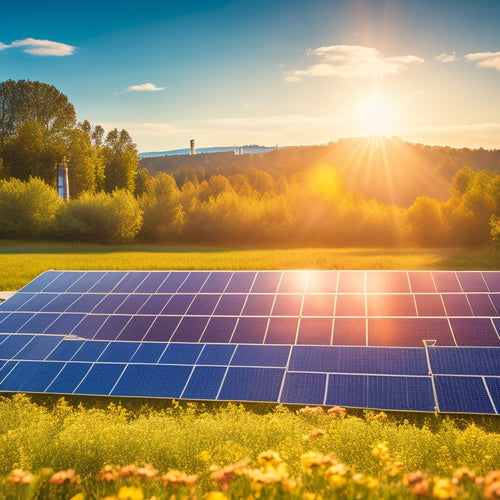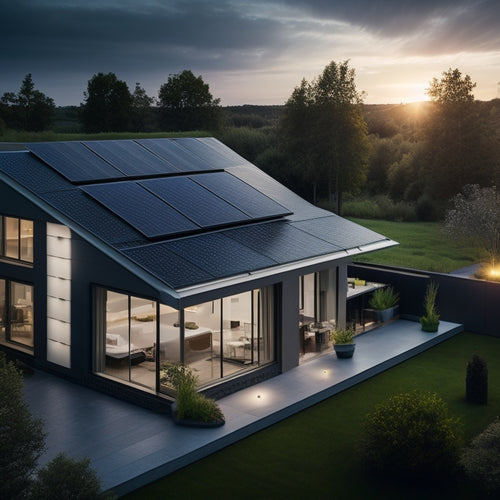
Portable Energy Independence for Mobile Dwellers
Share
You're seeking portable energy independence for your mobile dwelling, and that requires a customized approach. Start by evaluating your energy needs, examining areas for improvement, and analyzing your usage patterns. Next, choose high-efficiency solar panels with a 25-year warranty, and select deep cycle batteries that balance performance with budget. Size your solar power system to meet your daily energy needs, accounting for system efficiency losses. Finally, guarantee a safe and secure installation that meets local codes and regulations. With a solid foundation in place, you'll be well on your way to utilizing the freedom that comes with portable energy independence - and there's still more to investigate.
Overview
- Evaluate energy needs, including lighting, heating, and cooling, to determine the required solar panel size and energy storage capacity.
- Select high-efficiency solar panels with a 25-year warranty to ensure reliable energy generation and minimal maintenance.
- Choose deep cycle batteries with high amp-hour ratings and at least 500 cycle counts to provide steady power flow and long lifespan.
- Oversize the solar power system by 10-20% to account for efficiency losses and ensure daily energy needs are met.
- Ensure secure mounting, optimal angle, and proper grounding during installation to guarantee safety and performance.
Assessing Mobile Home Energy Needs
As you prepare to achieve portable energy independence, evaluating your mobile home's energy needs becomes an important first step.
To guarantee reliable energy production, it's vital to select solar panels with high efficiency, durability, and a minimum 25-year warranty high-efficiency solar panels.
You must identify areas where energy efficiency can be improved, reducing your reliance on traditional power sources. Assess your energy usage patterns, considering factors like lighting, heating, and cooling. This will help you determine the best size and configuration of your off-grid energy system.
By adopting sustainable practices and energy conservation measures, you can minimize your energy requirements. Effective power management is essential, as it enables you to utilize renewable sources like solar and wind power.
Choosing the Right Solar Panels
When selecting solar panels for your mobile home, you'll frequently encounter a plethora of options, each boasting unique characteristics.
To make an informed decision, it's important to understand the different solar panel types and their efficiency ratings. Monocrystalline, polycrystalline, and thin-film panels are the most common types, each with varying efficiency ratings. Monocrystalline panels offer the highest efficiency, typically above 20%, while polycrystalline and thin-film panels have lower efficiency ratings.
Reflect on the space available on your mobile home's roof and the amount of energy you need to generate.
When choosing a deep cycle battery to store excess energy, it's vital to evaluate maintenance frequency and the battery's overall lifespan. Higher-efficiency panels may be more expensive, but they'll provide more power per square foot.
Balance your energy needs with your budget to choose the right solar panels for your mobile home.
Selecting Deep Cycle Batteries
Your mobile home's energy storage system relies heavily on deep cycle batteries, which are designed to provide a steady flow of power over an extended period.
They're specifically designed for steady energy flow, making them ideal for solar applications Energy Storage and Efficiency.
You'll need to choose the right battery type for your system. Flooded lead-acid batteries are a popular choice, but they require regular maintenance.
Sealed batteries, such as AGM (absorbed glass mat) or gel batteries, are low-maintenance alternatives.
Consider the number of charge cycles you need, as this affects the battery's lifespan. A deep cycle battery with a high cycle count will provide more power over its lifetime.
Look for batteries with a high amp-hour rating and a cycle count of at least 500 to guarantee reliable performance.
Sizing the Solar Power System
With your deep cycle batteries selected, you're ready to determine the size of your solar power system.
To do this, you'll need to calculate your daily energy load. Make a list of your appliances, their wattage, and how many hours they'll be used daily. This will give you your total daily watt-hour requirement.
Consider system efficiency losses, such as charging and discharging inefficiencies, to guarantee you're generating enough power. Aim to oversize your system by 10-20% to account for these losses.
Next, use a solar panel sizing calculator or consult with a professional to determine the required solar panel wattage and array configuration. This will confirm you're generating enough power to meet your daily energy needs and maintain your freedom on the road.
Installation and Safety Considerations
Having determined the required solar panel wattage and array configuration, it's now time to focus on the physical installation of your system.
You'll need to choose suitable installation techniques that guarantee your solar panels are securely mounted and angled for ideal energy harvesting.
Make certain to follow safety regulations, such as wearing protective gear and verifying a stable ladder or platform when working at heights.
Properly ground your system to prevent electrical shock and confirm all connections are secure and watertight.
Consider consulting local electrical codes and regulations to assure your installation meets standards.
Frequently Asked Questions
Can I Use My Solar Power System While It's Still Charging?
You can use your solar power system while it's still charging, enjoying simultaneous usage and maximizing solar charging benefits; however, be cautious not to over-discharge your batteries, and monitor your system's performance to guarantee efficient energy harvesting.
How Do I Protect My System From Theft or Vandalism?
Like a guardian angel, you'll want to shield your important solar power system from theft or vandalism; consider security measures like tamper-evident labels and motion-sensitive cameras, and investigate insurance options to safeguard your investment and freedom.
Can I Add More Solar Panels to My Existing System?
You can add more solar panels to your existing system if they're compatible, guaranteeing seamless integration and expanding energy capacity. Check the manufacturer's specs, assess your system's limitations, and consult a professional to verify a safe, efficient upgrade.
Do I Need to Perform Regular Maintenance on My Batteries?
You'll need to perform regular maintenance on your batteries to guarantee peak performance and extend their lifespan. Check water levels, clean terminals, and monitor charging cycles to prevent sulfation, which can reduce capacity and overall battery life.
Are There Any Incentives or Tax Credits for Mobile Solar Systems?
You'll be pleased to know that you can capitalize on solar incentives and tax credits for your mobile solar system, such as the Solar Investment Tax Credit, which allows you to claim 26% of the total cost as a credit on your taxes.
Ready to Buy
As you utilize the power of the sun, your mobile dwelling evolves into a self-sustaining oasis, free from the shackles of grid dependency. Like a 19th-century pioneer settling the Wild West, you've staked your claim on energy independence. With your solar power system, you're ready to roam untethered, your batteries charged, your lights aglow, and your spirit unbridled. The open road beckons, and you're enabled to answer, unfettered by the constraints of traditional power sources.
Related Posts
-

Top Portable Refrigerators for Camping Adventures
When you're camping, having a reliable portable refrigerator can make all the difference for keeping your food fresh ...
-

Advantages of Solar Generating Systems Over Traditional Energy
Solar generating systems provide several key advantages over traditional energy sources. You'll experience lower long...
-

Home Solar Battery
You're opting for a home solar battery that allows you to utilize the power of the sun during the day and use it at n...


